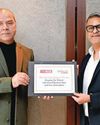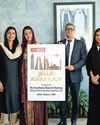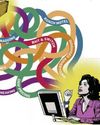
A nation's quest for national identity building, stability and social transformation depends on the development of science, technology and innovation (STI). The growth of China and India is dependent on technological transformation and technological leadership. As positive indicators of success, both countries are rising steadily in this field.
China is an upper middle-income country and India is a lower middle-income country. Being neighbours and starting their independent growth journeys simultaneously, they often prompt comparison between them. To forecast the future growth trajectory and global power trends involving these two countries, the science, technology and innovation (STI) indicators serve as a global framework for measurement, analysis, comparison, technological intelligence and strategic statistical data.
The chief components of these indicators include research and development endeavours and innovation systems.
India began its post-independence journey with the goals of modernisation and, having missed the industrial revolution, focused on planned public investments in higher education, science and technology, agriculture, energy and industry. As India faced a volatile strategic environment, S&T in defence and military became a necessity. The Indian space programme, nuclear programmes and Antarctic programme benefited from the support of the Soviet Union and sporadic contributions from the US and other western powers.
India has rolled out four strategic documents for STI since 1947-science policy resolution (1958), technology policy statement (1983), science and technology policy (2003) and science, technology and innovation policy (2013). The fifth one is soon to be launched as the national science, technology, and innovation policy and is under public consultation. These policies have underlined priorities, sectoral focus and strategies for STI development in India.
Denne historien er fra July 21, 2024-utgaven av THE WEEK India.
Start din 7-dagers gratis prøveperiode på Magzter GOLD for å få tilgang til tusenvis av utvalgte premiumhistorier og 9000+ magasiner og aviser.
Allerede abonnent ? Logg på
Denne historien er fra July 21, 2024-utgaven av THE WEEK India.
Start din 7-dagers gratis prøveperiode på Magzter GOLD for å få tilgang til tusenvis av utvalgte premiumhistorier og 9000+ magasiner og aviser.
Allerede abonnent? Logg på

Lessons in leadership
When I began my career at Hindustan Lever (as HUL was then called), I was deeply inspired by our chairman, Dr Ashok S. Ganguly.

Political colours
One of the greatest fashion statements of recent times was made in the Parliament's winter session by Rahul Gandhi and some opposition colleagues. India's most news-making politician (since his landmark Bharat Jodo Yatra) gave up his signature white polo T-shirt for a blue one.

Chat roam
Vox pop content is seeing an uptick in India, with creators making conversations on current and social issues fun and funny

Back home with BANNG
Michelin star-winning chef Garima Arora, who recently opened her first restaurant in India, on all things food and family

One supercalifragilisticexpialidocious New Year
Once Christmas is over, tension mounts in our home as the little woman and I start ticking off the days. We both remain on edge because we dread the coming of the New Year—a time when the whole world goes crazy and adopts resolutions. We, too, make New Year promises and our ‘list of past resolutions’ is very long and impressive. Unfortunately, we are complete failures at keeping them and our ‘list of resolutions not kept’ is equally long and equally impressive.

Six or out?
Cricket is a quasi-religion in India. And our pantheon of cricketers is worshipped with a fervour bordering on hysteria.

DOWN AND UNDER THE WEATHER
After their flop show in Australia, Virat Kohli and Rohit Sharma will have to live on current form rather than past glory

The new in news
THE WEEK and DataLEADS partner to revolutionise news with fact-checks, data and Live Journalism

Hello Middle East
Reem Al-Hashimy, UAE minister of state for international cooperation, inaugurates a special Middle East section on THE WEEK website

BAIT CLICK
Dark patterns fool millions of Indians every day. The government is finally acting, but it just may not be enough